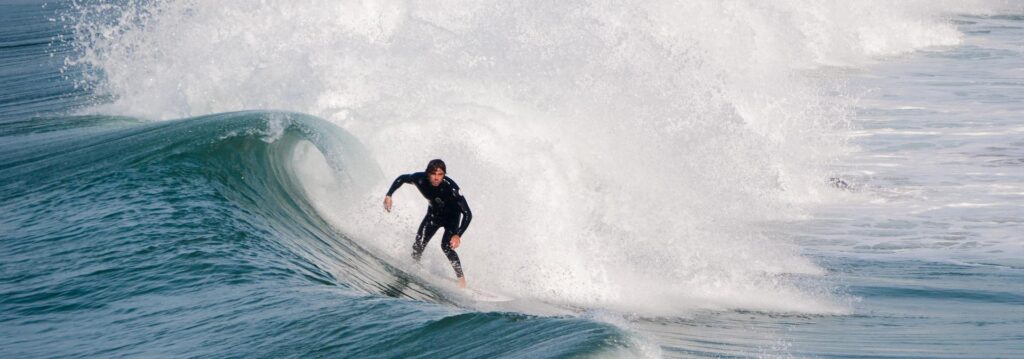
This week, I watched as a series of nasty energy waves ensnared a bunch of folks in my circle of loved ones and acquaintances. A couple of the waves that hit were made of nothing more than incessant aggravations. But some were huge and full of fury. And they came out of nowhere, without precedent or warning. I won’t burden you with details. I will say that I got caught in a couple of them, too.
There was a time when blows as hard as these would have been enough to knock me down and maybe even drown me. But luckily, over the years, I’ve learned how to ride them.
(I like that description, by the way, because it reminds me of an old poster that shows this robed, bearded old guru, soaking wet and riding with outstretched arms and a broad grin on a surf board atop a big, rolling wave. “You can’t stop the waves,” the poster said. “But you can learn how to surf.”)
Ah, yes. Surfing the waves. It’s not a skill that you develop overnight. Well, unless you’re one of those blessed few who are suddenly struck with enlightenment or maybe have a near-death experience that convinces you that in the end all is well.
Nope. It takes practice. It’s one of those things that are simple, but not easy. And it’s not easy because you have to remember to practice it. In essence, it’s a matter of being in the present, of attending to what’s right in front of you, of what you’re doing right now.
We get caught up in playing emotionally charged tapes from our past – like the argument we had with someone this morning, or something somebody said that pushed one of our buttons . Or we get lost in problem-solving for the future, like planning what we could have for dinner or what might happen at the meeting tomorrow. The present zips past without our even noticing. We’re so mesmerized by our mind-movies that what’s right in front of us is absolutely invisible.
I went for a walk once with a friend who suffered from schizophrenia. He was taking his meds and in an upbeat mood that day. As we walked he was telling me about his favorite Broadway plays and singing the lyrics from them with heart and animation, as if he were the star performer on the stage.
Every now and then, I’d point out something in the environment that caught my eye. “Oh! Look at the trim on that house!” I’d say. Or “Isn’t that a beautiful flower!” Then I’d let him talk and sing some more. He sang wonderfully and was very entertaining.
As we got back to my house, I pointed out one more thing that I noticed. He stopped in his tracks and looked at me in wonderment. “Can you do that all the time?” he asked incredulously.
“Do what?” I asked. I had no idea what he meant.
“See what’s out there!” he said.
His comment gave me a profound insight into his situation. The thoughts in his head were so intense that for someone to notice what was in the immediate environment seemed an act of magic.
But the fact is, without being ill at all, most of us spend nearly all of our time lost in our own inner dramas, in our thoughts and our interpretations and our memories and problem solving. We’re just wired that way. We live in our stories instead of in the actual moment that’s unfolding all around us. And we react with our emotions to whatever stories we’re telling ourselves, instead of seeing what is real and choosing how we want to respond.
The key to escaping from these inner movies is simply to practice noticing what’s really going on right now. In fact, that’s a question you can learn to ask yourself: “What’s really going on right now?” (Jot that down and put it somewhere that you’ll spot it from time to time.) Then tune in to the moment. You can practice doing a body scan, for instance, to see where you’re tense right now and let that area soften and relax up a bit. Or notice what your posture is telling you. You can take a sensory break every now and then and notice what data each of your senses is offering you. You can stop from time to time to see how long you can keep your attention on your breathing. You can describe to yourself what you’re doing: “This is me, washing dishes, seeing the soap bubbles, feeling the warm water and the texture of the plates, hearing the sounds they make as I wash them.”
The big benefit of staying in the present is that you learn not to make programmed judgments about what is happening. Things are just happening. Right now. You don’t know where they’ll lead. The future isn’t here yet and could hold anything. So you’re not upset, or giddy, or frustrated, or angry. You’re not projecting into the future or resurrecting reactions from the past. You’re not comparing what’s going on to what you wanted or feared. You’re simply observant, and maybe curious, and probably more awake, and most likely quite appreciative.
Don’t worry; you won’t get stuck there. You’ll still look for the way that events have meaning for your life. You’ll still have real problems that require real solutions. But you’ll look at things from a refreshed perspective, and the rhythm of the waves will be just that – a rhythm that you learn to flow with, atop it all, wet maybe, but balanced and at peace.
Wishing you presence, right here, right now, all week.
Warmly,
Susan
Image by Devon Chandler from Pixabay